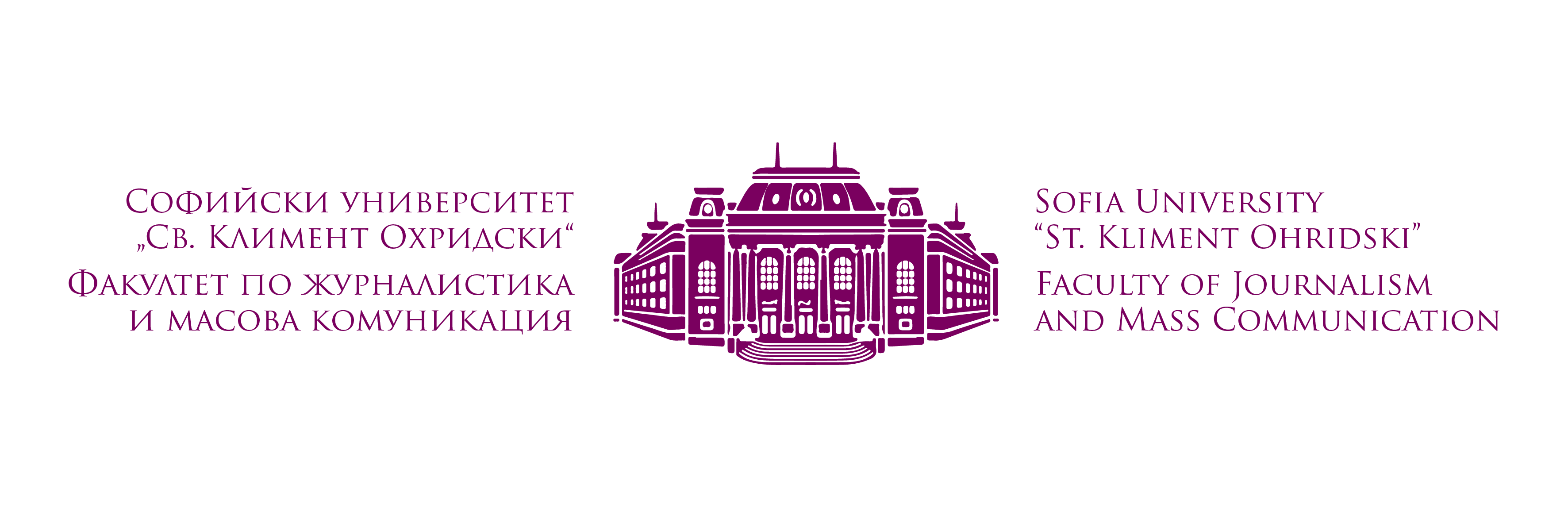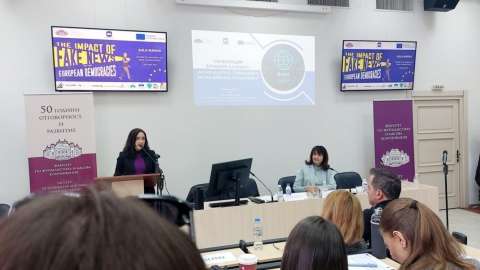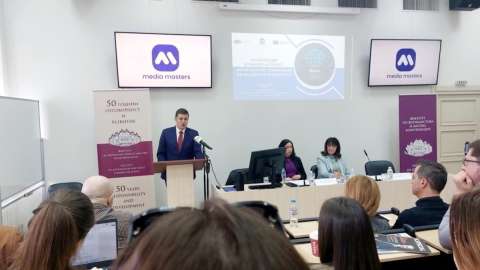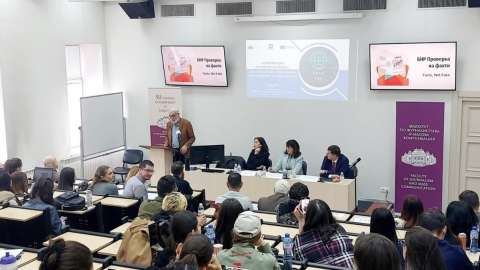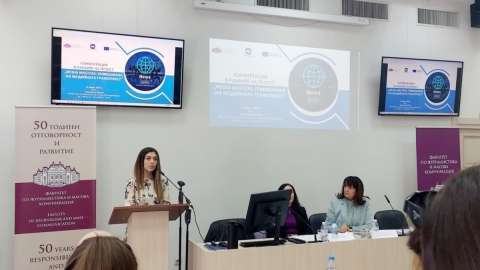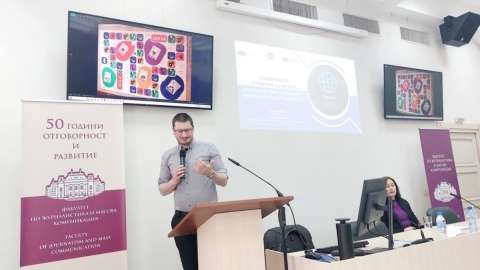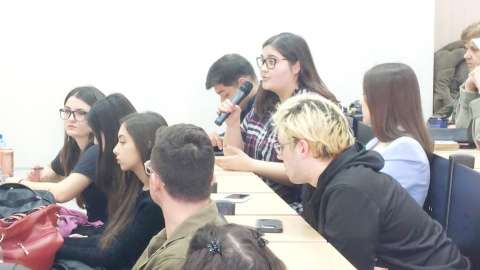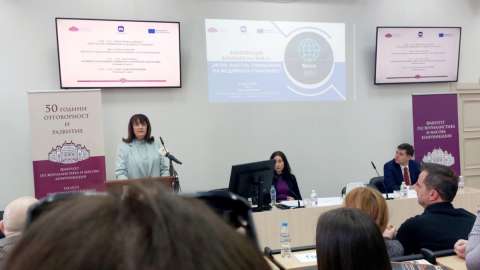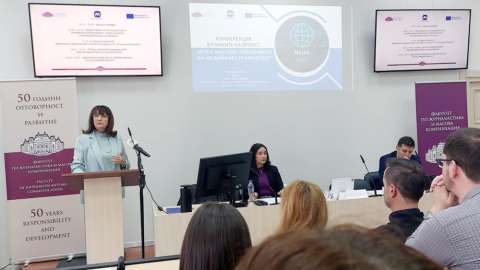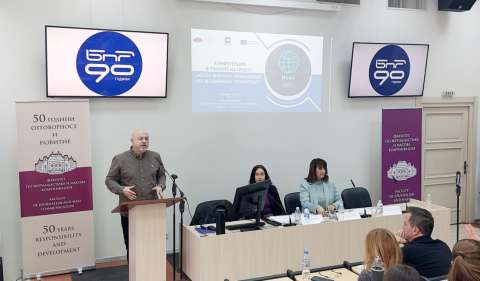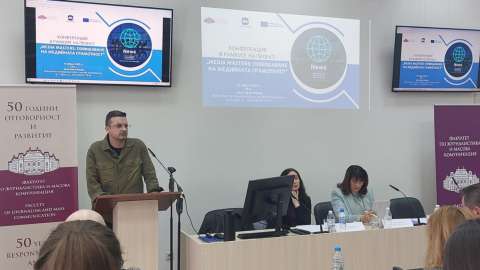Conference at FJMC focused on media literacy
In the Aula Magna Hall of the Faculty of Journalism and Mass Communication of Sofia University "St. Kliment Ohridski" was held the first conference on "The Influence of Fake News on European Democracies".
The event is part of the project "Media Masters: Raising Media Literacy " (CERV-2023-CITIZENS-CIV-01148165), funded by the Citizens, Equality, Rights and Values Programme of the European Union.
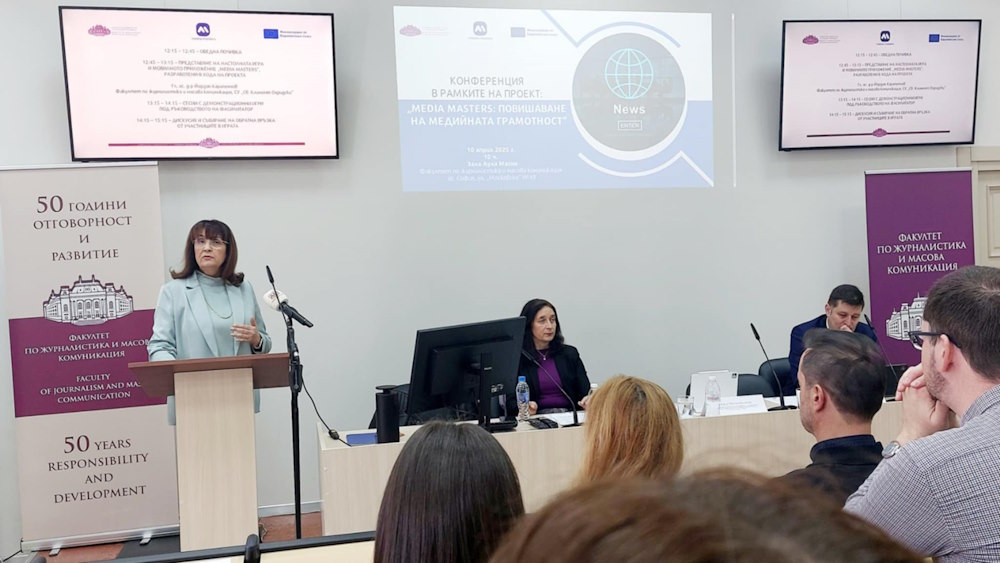
The conference was opened by prof. Vesselina Valkanova, Dean of the FJMC and Head of the project, who stressed the importance of education and inter-institutional dialogue in the fight against misinformation.
During the event she presented the project "Media Masters: Increasing Media Literacy", funded by the Citizens, Equality, Rights and Values Programme of the European Union. Part of it are the game and the app, the software of which is ready, explained prof. Valkanova.
"In the development of the project we are presenting today, we have united around the thesis that in the age of misinformation and digital noise, media literacy is a key tool towards people's ability to make informed choices, develop critical thinking, build a digital culture and ultimately defend democratic values," said the dean of FJMC. A consortium of nine EU countries - Bulgaria, France, Italy, Spain, Croatia, Greece, Cyprus, Slovenia, and Ireland - is working on the project.
Prof. Veselina Valkanova explained that the project will involve students from both secondary and primary grades. The project is highly practical, she added.
It is still early to draw conclusions, but I think that through such groups, models can promote critical thinking and encourage, to encourage young people to recognize misinformation and manipulative, manipulated content, said the dean of the FJMC. Prof. Valkanova noted that both products were created so that they could be used after the project was completed.
According to her, the focus of the initiative is quite bold - to engage young people in certain social projects, in civil dialogue. One of the goals of the project is also to provide valuable data for future research and feedback, the results of which will be published, she said. "We hope that we will have a great contribution in verifying the functional tests of the first version of the project and the board game and in establishing how effective the development can be as a pedagogical tool to improve media literacy in young people," said the Dean of the Faculty of Journalism and Mass Communication.
She also said that all the scenarios and questions that are included in the game and the app are based on real events. "We believe with our colleagues who are involved in the consortium that this is the most effective way to spark the interest of young people and encourage discussion and engagement," said Prof. Vesselina Valkanova.
According to her, besides politics and political news and events, the game also includes topics that are more similar to the target age groups. "Misinformation is this complex phenomenon that spreads very widely globally, can undermine human rights, and can threaten and actually threaten European democracies. Moreover, the technologies of recent years have made disinformation even more difficult to recognise. Artificial intelligence is now intervening, through which fake news, DeepFake videos and online scams can acquire unprecedented levels of credibility. In fact, this is the big threat - the difficulty of detecting the fake from the actual, verified, true content. The threat is not simply the presence of fake news in today's communications environment, but rather the speed, the scale at which it is disseminated," said Prof. Veselina Valkanova. According to her, in the current world cybersecurity is not just a matter of technology, but also of human behaviour.
The dean of FJMC believes that counteracting acts of misinformation is through educational projects, programs, campaigns, including actions in traditional media, not only in the new media. "It is a fact that young people use social networks and the internet in general and digital online platforms differently. This can contribute to building civic engagement. However, I do not share the thesis of some scholars that this civic engagement arises somehow spontaneously, naturally from the use of digital media. On the contrary, I think that media literacy education is absolutely necessary to provide that cognitive, social construct, that scaffolding on which to build these attitudes, reflexes and ultimately the civic engagement of young people. Including social participation", said Prof. Valkanova.
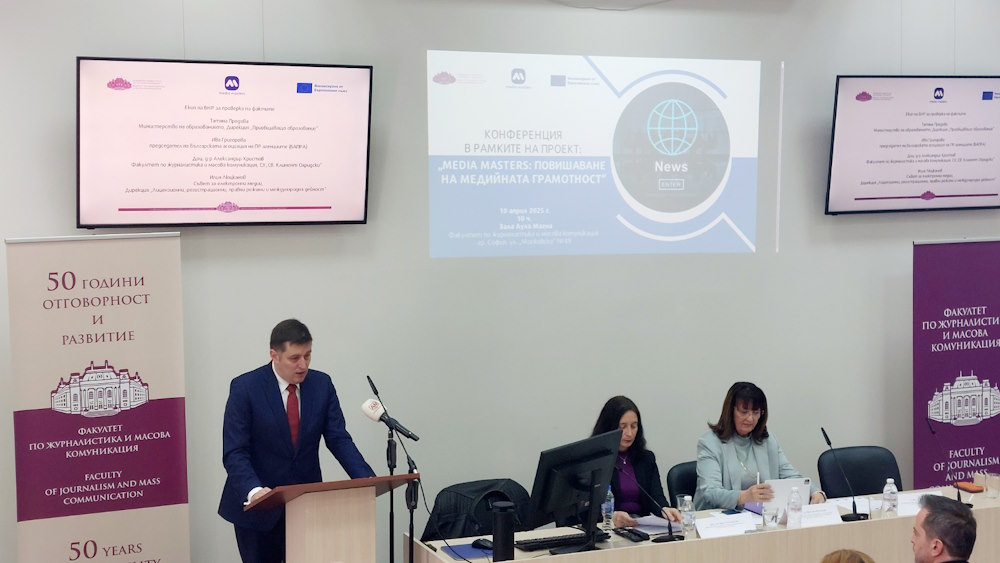
An official speech was also delivered by Milen Mitev, Director General and Chairman of the Board of the Bulgarian National Radio, as well as a member of the Board of the European Broadcasting Union (EBU). He stressed the commitment of the BNR team to verify information and provide access to reliable sources for its listeners.
Quality journalism is becoming increasingly difficult to fund because more and more people think that anyone can be a journalist and create audio and video content with just their phone, Milen Mitev said. He said it is increasingly difficult to explain what the point of having media outlets with their perhaps at times cumbersome structure is, but which gives some guarantees that the output of that media outlet will be verified. "This financial pressure comes at precisely the time when there is a huge need for strong media. Efficiency is a good thing, but when we want to counter misinformation, the traditional media, both public and commercial, must be strong. I recently had the opportunity to speak to the director of the BBC, who said that in all the countries that the BBC World Service is withdrawing from, Russian channels are coming on the frequencies it is releasing, which I think is in itself a sufficient example," Mitev said.
Mitev cited a 2022 Eurobarometer survey that found that public service news media enjoyed the highest level of trust in 28 of the 31 European countries that participated in the survey, including 25 European Union member states. "On average across the EU, 49 percent of citizens rank the public media as the most trusted source of information, followed by the press in second place with 39 percent. And commercial media came in at 27 percent. This creates a huge difference in the average trust in the news of public and commercial media," said Milen Mitev. Mitev commented that among the main challenges facing our media and societies today are overinformation, increasing competition for audience time and the devaluation of the journalism profession.
Participants included:
- Ivo Todorov, Director of Digital Programmes at BNR
- The fact-checking team of BNR, who presented their experience in fighting disinformation
- Iva Grigorova, Chairperson of the Bulgarian Association of PR Agencies (BAPRA)
- Ilia Lyutskanov, Chief Expert of the Council for Electronic Media
The discussions focused on the challenges European democracies face in the face of information noise and manipulation, as well as the need for sustainable policies and educational tools to increase media literacy.
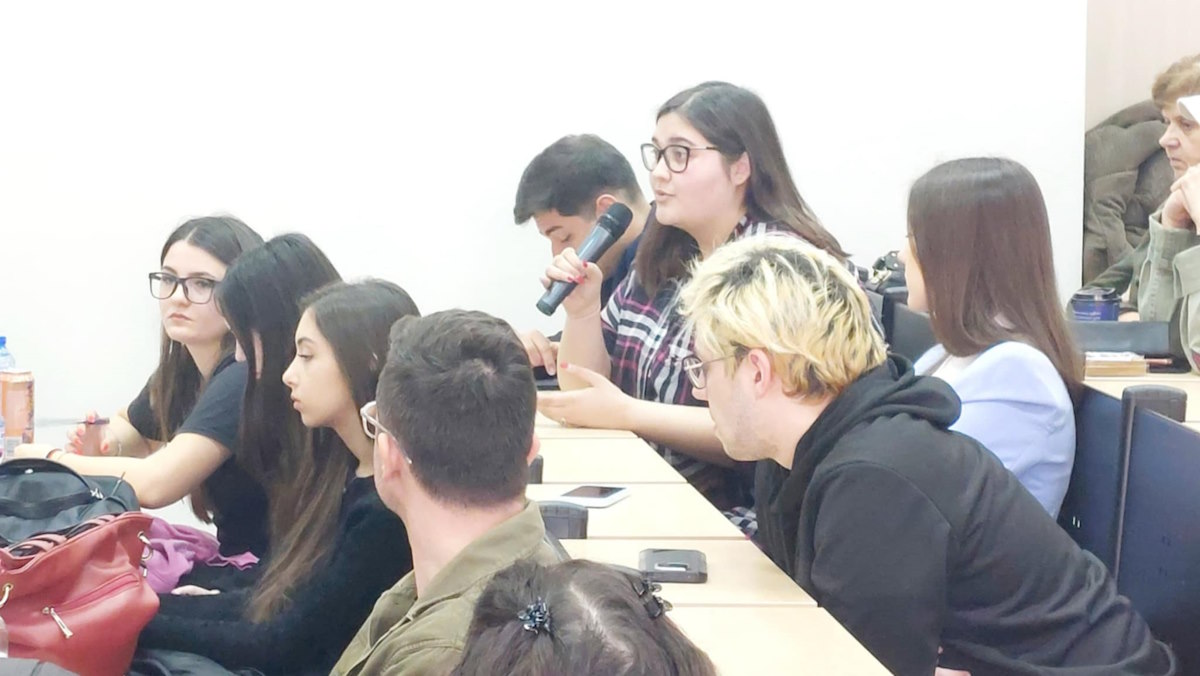
Assoc. Prof. Mila Serafimova presented the board game and the app developed within the Media Masters project. "This game can be played with a moderator, who can be the teacher at school, since students still have the topic of media literacy in class and other subjects," said Assoc. Serafimova. According to her, with such a playful approach, many important aspects of media literacy can be explained. We have helped with this to come up with topics for debate and discussion with students, she said. presented the board game and app developed within the Media Masters: Raising Media Literacy project. "This game can be played with a moderator, who can be the teacher in school, since students still have the topic of media literacy in class and other subjects," said Assoc. Serafimova.
The big challenge of this project was how to make something meaningful that would work in several countries at the same time, said Dr. Jordan Karapentchev, who presented the mobile application to the project. "One of the questions we have in the board game is whether Hristo Botev's work will be dropped from literature textbooks, because periodically things like that come up. This in France tells them nothing and this question cannot be asked. They have their own problems, their own assignments. And the solution that we have found to this problem is for each country to generate different questions. And that's the very key mechanic of the game," he explained.
The program also included:
- A discussion on the impact of misinformation on democratic processes
- a presentation of the board game and the "Media Masters" mobile app
- demonstration games with audience participation aimed at identifying manipulative content
- an open discussion with the active involvement of students from FJMC
The event provided a valuable platform for interaction between the academic community, media professionals and civil society representatives in order to build a more informed, critical and sustainable society capable of countering contemporary forms of misinformation.
